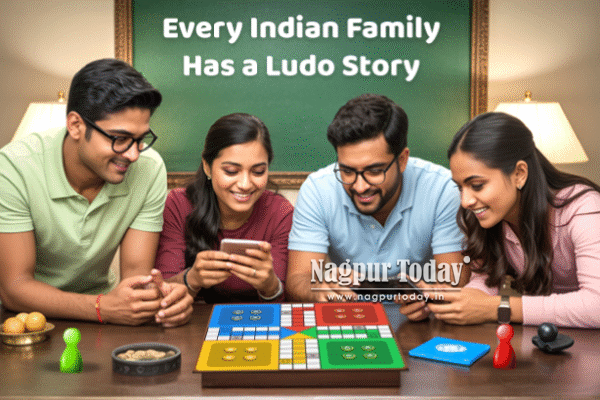It begins with a roll of the dice. The clatter of plastic against cardboard, the glint in someone’s eyes as they get a six, and a teasing remark from across the floor, “Chalo, ab tumhara ek goti gaya!”, Ludo is not just a game in Indian households. It is a cultural ritual, a pocket-sized time machine, a peacemaker, and sometimes, a gentle firestarter. Simply put, every Indian family has a Ludo story.
The Humble Origins of a Legendary Game
Known originally as Pachisi, the roots of Ludo date back centuries to ancient India, where it was played in royal courts. What began as a game of strategy and luck among emperors eventually found its way to drawing rooms, verandahs, and now, mobile screens. With its simplified rules and vibrant board, Ludo became a household staple, accessible to children, elders, and everyone in between.
A Game for All Generations
From Dadi to the youngest cousin, Ludo is perhaps one of the rare games that crosses generational boundaries. The rules are simple: four tokens, one goal, get them all to the center. But the emotions it stirs are far from simple. Each move is a mini-drama; every roll of the dice can be a turning point. For many Indian families, these moments are etched in memory, lazy Sunday afternoons, power cuts in summer, or rainy-day school holidays, always with the Ludo board at the center of it all.
Not Just a Game, But a Family Tradition
Ludo has long served as a unifying thread in Indian family life. In an era before smartphones and streaming services, it was the ultimate form of screen-free bonding. Families sat together on the floor, legs crossed, snacks within reach, and laughter echoing through the room. It didn’t matter who won or lost, it mattered that you played.
The game has also undergone a transition from traditional to digital platforms, evolving its dynamics while retaining its essence. Today, online Ludo apps allow families separated by geography to recreate the magic, virtually. Parents in India and kids studying abroad can still “kill” each other’s tokens with the same mischief and glee.
The Emotions Behind the Game
Ask any Indian ludo player about their most memorable Ludo moment, and chances are, they’ll narrate it like a cricket match highlight. The time they rolled three sixes in a row. The time their cousin got so competitive, he flipped the board. Or the time they formed secret alliances to knock someone out, only for that alliance to betray them.
There’s always a story. And usually, it’s not just about the game. It’s about family dynamics, friendly fights between siblings, grandparents showing no mercy, or someone storming off in mock rage. These emotions, raw and real, add to Ludo’s charm.
Lockdown Diaries: Ludo to the Rescue
If there was ever a time when Ludo made a full-blown comeback, it was during the pandemic lockdowns. With the world under pause, families found themselves rediscovering the charm of this age-old game. Ludo saw a 300% rise in mobile app downloads in India during 2020 alone. People craved connection, familiarity, and a sense of control, Ludo offered all three, wrapped in the comfort of nostalgia.
For many, it became more than just a pastime, it became therapy. An escape from headlines and worries. An hour of smiles, suspense, and sibling banter.
Ludo Teaches Us More Than We Realise
Beyond entertainment, Ludo subtly imparts life lessons. It teaches patience, you can’t always roll the number you want. It teaches resilience, your token may get cut, but you start again. It teaches humility, sometimes even a perfect plan gets derailed by chance.
More importantly, it teaches emotional intelligence. Handling defeat gracefully. Cheering for others. Understanding that you win some and lose some, but the joy lies in playing.
As Anuj Mehra, a psychologist and father of two, explains: “I encourage my children to play Ludo not just for fun but to help them develop turn-taking, decision-making, and emotional coping skills. It’s more than just moving pawns, it’s learning to move through life.”
Modern Twists, Timeless Appeal
Even as Ludo enters the digital age, its core appeal remains unchanged. Modern versions come with avatars, chat features, and tournaments offering real money. But the thrill of knocking out a token, the triumph of getting home first, and the drama over dice rolls—none of that has changed.
Brands and gaming platforms are capitalizing on this nostalgia-fueled popularity, organizing Ludo championships, themed merchandise, and celebrity-led campaigns. But what keeps the game alive isn’t marketing, it’s the emotion it carries. The stories. The memories. The unspoken promise of, “Chal ek game ho jaaye?”
Every Family, A Unique Ludo Story
What makes Ludo so special is that it’s both universal and personal. The rules are the same, but the stories they inspire are different in every home. From sibling rivalries and childhood tantrums to bonding with grandparents and inside jokes, it weaves itself into the fabric of Indian family life.
It’s a game that grows with you. You may play it differently at 10, 25, or 50, but it always takes you back to a place of warmth. A place where time slows down. A place called home.
In Conclusion
Not every game becomes a memory. Not every game becomes a story. But Ludo does. Whether it’s played on a worn-out board passed down generations or a sleek mobile app, it holds the same magic. In every corner of India, there’s a family with a Ludo tale to tell. Perhaps that’s why, when it comes to Ludo, the board is square, but the emotions it brings? Infinite.
So the next time you roll a six, smile. You’re not just playing a game, you’re reliving a legacy. So download the Ludo app now and start rolling.















